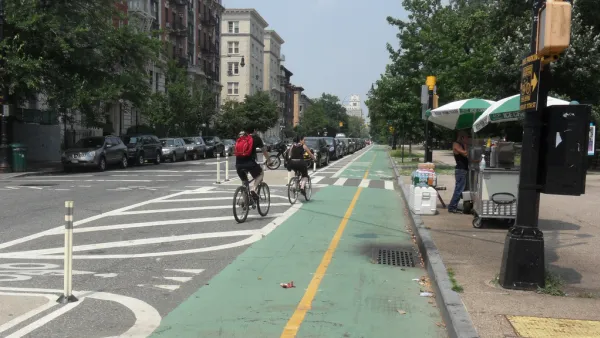Irvin Dawid discovered Planetizen when a classmate in an urban planning lab at San Jose State University shared it with him in 2003. When he left San Jose State that year, he took with him an interest in Planetizen, if not the master's degree in urban & regional planning.
As a long-time environmental activist, he formed the Sustainable Land Use committee for his local Sierra Club chapter and served six years on the Bay Area Air Quality Management District’s Advisory Council from 2002-2008. He maintains his interest in air quality by representing Sierra Club California on the Clean Air Dialogue, a working group of the Calif. Environmental Dialog representing business, regulatory and public health/environmental interests.
Major interests include transportation funding, e.g., gas taxes, vehicle miles traveled (VMT) fees, road tolls and energy subsidies that lead to unlevel playing fields for more sustainable choices.
He hails from Queens (Bayside) and Long Island (Great Neck); received an AAS in Fisheries & Wildlife Technology from SUNY Cobleskill and a B.S. from what is now Excelsior College.
After residing for three years on California’s North Coast, he’s lived on the San Francisco Peninsula since 1983, including 24 years in Palo Alto. Home is now near downtown Burlingame, a short bike-ride to the Caltrain station.
He’s been car-free since driving his 1972 Dodge Tradesman maxi-van, his means to exit Long Island in 1979, to the junkyard in 1988.
Major forms of transportation: A 1991 'citybike' and monthly Caltrain pass, zone 2-2. "It's no LIRR, but it may be the most bike friendly train in America."
Irvin can be reached at [email protected]
Oil and Gas Revenue May Fund Texas Roads
The nation's largest oil and natural gas producer is flush with revenue from energy production. If Gov. Rick Perry signs the bill supported by two-thirds of both chambers, voters will decide whether to use about $1.2 billion of it annually for roads.
Protected Bike Lanes May Receive Federal Recognition
While protected bike lanes have yet to be recognized by AASHTO, they are en route to being recognized by US DOT, writes Green Lane Project's Michael Andersen. With federal guidance, transportation engineers may be more willing to build cycle tracks.
Death By Auto: Are They Always Accidents?
Sarah Goodyear describes the greater implications of the carnage caused by a motorist intent on mowing down as many pedestrians as possible on the Venice boardwalk in L.A. on August 03. It wasn't the first time a car caused mayhem in a public space.
Libertarian Foundation Uses CEQA to Litigate 'Plan Bay Area'
The group, Bay Area Citizens, worried about loss of property values and quality of life, will be represented by the libertarian Pacific Legal Foundation, which will use CEQA as the basis of the lawsuit against regional agencies MTC and ABAG.

Got Protected Bike Lanes?
While Angie Schmitt doesn't ask this question in her article on the movement behind these lanes, she writes that cities without them "are being left behind". They're popular because they effectively address the #1 reason for not riding: safety

























